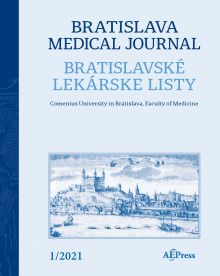Journal info
|
||||
Select Journal
Journals
Bratislava Medical Journal 2024 2023 2022 2021 2020 2019 2018 2017 2016 2015 2014 2013 2012 Ekologia - Ecology Endocrine Regulations General Physiology and Biophysics Neoplasma Acta Virologica Studia Psychologica Cardiology Letters Psychológia a patopsych. dieťaťa Kovove Materialy-Metallic Materials Slovenská hudba 2025Webshop Cart
Your Cart is currently empty.
Info: Your browser does not accept cookies. To put products into your cart and purchase them you need to enable cookies.
Bratislava Medical Journal Vol.119, No.8, p.490–493, 2018 |
||
| Title: Evaluation of pentraxin-3 in familial Mediterranean fever patients during attack and attack-free periods | ||
| Author: M. Gok, O. Sirkeci, M. Kara, Y. S. Sakin, A. Tanoglu, E. E. Sirkeci, H. Oztin, T. Duzenli, M. Kaplan, Y. Yazgan, O. M. Ipcioglu | ||
| Abstract: INTRODUCTION: Pentraxin-3 (PTX-3) is a prototype of pentraxin proteins that have been shown to be involved in acute phase response. In this study, we aimed to investigate the relationship between PTX-3 levels and familial Mediterranean fever (FMF) disease, and to evaluate PTX-3 as a novel diagnostic marker of FMF. METHOD: Forty-three male patients diagnosed with FMF and 42 healthy individuals were included in the study. Patients with other inflammatory diseases and patients who used drugs having anti-inflammatory properties were excluded from the research. Blood samples were obtained during both attack and attack-free periods. RESULTS: Patient attack periods were confirmed by combining physical examination and elevation of acute phase reactants. Acute phase reactants were significantly higher in attack versus attack-free periods (p < 0.01), however PTX-3 levels were not significantly different between the two periods. Additionally, PTX-3 levels in FMF patients were higher than in controls in both attack (917.29 ± 725.29 vs 451.83 ± 291.95, p < 0.01) and attack-free periods (748.23 ± 487.53 vs 451.83 ± 291.95, p < 0.01). CONCLUSION: In this study, we showed that PTX-3 levels, in both FMF attack and attack-free periods, were significantly higher than in the control group. Finally, PTX-3 may be a promising biomarker for FMF diagnosis and may predict FMF attacks (Tab. 2, Fig. 2, Ref. 18). |
||
| Keywords: familial Mediterranean fever, pentraxin-3, inflammation | ||
| Published online: 30-Aug-2018 | ||
| Year: 2018, Volume: 119, Issue: 8 | Page From: 490, Page To: 493 | |
| doi:10.4149/BLL_2018_089 |
||
|
|
 download file download file |
|

